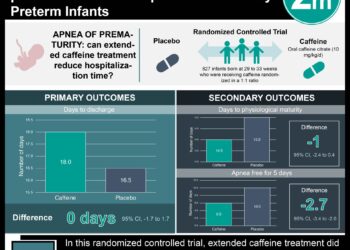Low-to-Moderate caffeine intake during pregnancy is not associated with increased risk of maternal cardiometabolic complications
1. A cohort study of 2583 pregnant women found that low or moderate caffeine intake (<200mg/day) did not significantly increase the risk of maternal cardiometabolic complications including gestational diabetes, preeclampsia and gestational hypertension.
2. Low-moderate caffeine intake was associated with a lower risk of gestational diabetes mellitus and lower blood glucose levels during diabetes screening compared to no caffeine intake.
Evidence Rating Level: 2 (Good)
Study Rundown: Despite being one of the most commonly used substances worldwide, the effects of caffeine consumption in some populations remains poorly understood. Pregnant women in particular are recommended to intake no more than 200mg of caffeine per day, as high levels of daily caffeine consumption can increase the risk of pregnancy loss and fetal growth restriction. However, there remains mixed evidence for the role of low to moderate amounts of caffeine intake in pregnancy, creating confusion for patients and physicians alike. The present study sought to assess maternal cardiometabolic health outcomes in pregnant women who did, and did not consume low to moderate amounts of caffeine. 2583 pregnant women participated in this prospective cohort study, attending 4 study visits between weeks 16 and 37 of their pregnancy. Exposure to caffeine was assessed using women’s self-reported caffeinated-beverage intake as well as measurements of serum caffeine and paraxanthine levels. Race, nulliparity, education level, marital status, alcohol intake prior to pregnancy, perceived stress and diet were all significantly associated with the amount of daily caffeine intake. Caffeine intake between 1-100mg/day during weeks 16-22 of pregnancy was associated with decreased risk of gestational diabetes (GDM) and lower blood glucose compared to no intake. Neither caffeinated beverage intake or plasma caffeine concentration were associated with the development of gestational hypertension or preeclampsia. The present study by Hinkle et al provides an interesting overview of patterns of caffeine intake amongst pregnant women in the United States in addition to demonstrating its relative safety with regards to cardiometabolic outcomes in this population. They found that low to moderate daily caffeine intake had no bearing on blood pressure and may even be protective against hyperglycemia and GDM. A major drawback of the study was the relatively small sample size which may have made it difficult to detect associations with other, less common pregnancy complications. Additionally, selection of particularly healthy participants is not representative of the average American pregnant woman. The authors did well to conduct robust sensitivity analyses adjusting for employment, family history of diabetes, severe nausea/hyperemesis, pre pregnancy alcohol intake, stress, sleep, physical activity, diet and energy intake. The results of this study should be taken in context to reassure patients that low-moderate daily caffeine consumption is not overtly harmful during pregnancy, although further study of additional maternal and fetal outcomes is warranted.
Click to read this study in JAMA Network Open
Relevant Reading: Association of maternal caffeine intake during pregnancy with low birth weight, childhood overweight, and obesity: a meta-analysis of cohort studies
In-Depth [prospective cohort study]: This was a multi-centre prospective cohort study done in 12 sites across the United States. Participant data was derived from an existing cohort of pregnant women participating in a fetal growth study; the cohort composition overrepresented pregnant women of racial/ethnic minority groups. Patients were enrolled for the present study between weeks 8 and 13 of pregnancy. Exclusion criteria included: high or low BMI, smoking, alcohol consumption in pregnancy, use of assistive reproductive technology to conceive, pregnancy complications and chronic disease. Patients who dropped out of the study or who had missing data were found to be not significantly different from those analyzed in terms of caffeine intake and plasma caffeine. The most commonly consumed beverages amongst the caffeine-drinking cohort were as follows: soda (58.5%), coffee (40.6%), tea (32.1%) and energy drinks (0.5%). The significance of the following factors with amount of daily caffeine intake is given by p-values (in brackets) less than 0.05: race (0.002), nulliparity (<0.001), education level (0.002), marital status (<0.001), alcohol intake prior to pregnancy (<0.001), perceived stress (0.002) and diet (<0.001). The relative risk of GDM with caffeine intake between 1-100mg/day compared to no caffeine was 0.53 (95% confidence interval 0.35-0.80), with a risk reduction value of 47%. This exposure was also associated with lower blood glucose concentrations by 2.7mg/dL compared to no caffeine (95% confidence interval -5.4 to 0). These findings were robust to sensitivity analyses. Biochemical analysis completed in a subset of the sample found that plasma caffeine and paraxanthine in the fourth quartile at 10-13 weeks of pregnancy was not associated with GDM or impaired glucose tolerance, and that blood glucose concentrations were 3.8mg/dL (-7 to -0.5) lower compared to those in the first quartile. Caffeine intake between 16 and 22 weeks was also associated with improved markers of cardiometabolic health.
Image: PD
©2021 2 Minute Medicine, Inc. All rights reserved. No works may be reproduced without expressed written consent from 2 Minute Medicine, Inc. Inquire about licensing here. No article should be construed as medical advice and is not intended as such by the authors or by 2 Minute Medicine, Inc.






